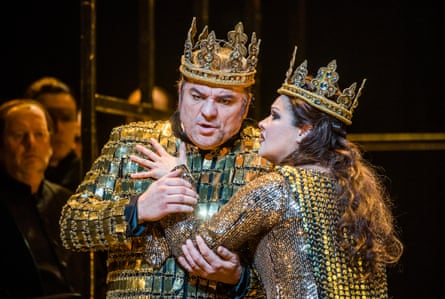Operatically speaking, nothing beats a world-class diva in her prime. Every appearance, because you can never be certain it will happen, ups the ante. The Russian soprano Anna Netrebko, last seen at the Royal Opera House in 2015 as Mimi in La bohème, with a couple of near misses (OK, cancellations) in between, is back in the UK for Verdi’s Macbeth. The wait was worth it.
Netrebko pulled out of Norma at the ROH in 2016 – planned with her in mind – because she realised she couldn’t stand the piece, which seems an excellent reason. Who’d want to be a druid high priestess anyway. Far better the thrilling, devilish challenges of the first lady in Macbeth (1847), a fiercely difficult role which Netrebko handles with outstanding strength, control and, especially in her sleepwalking scene, nuance. The voice is richer, supple in the lower register so important here, less brilliant at the top but on peak form.

Netrebko’s presence, with the Serbian baritone Željko Lučić imposing and ripe-toned as Macbeth – they caused a sensation as a double act in the New York Met’s production in 2014 – gave new lustre to Phyllida Lloyd’s 2002 black, red and gold staging, back for a third revival. Anthony Ward’s tableaux sets, illuminated by moments of gaudy splendour in Paule Constable’s lighting design, offer a steady structure to support the action. It’s a dark setting for the darkest of plays.
With Ildebrando D’Arcangelo resplendent as Banquo, Yusif Eyvazov a decently sung Macduff and several fine Jette Parker Young Artists in supporting roles, the cast is excellent. The American soprano Francesca Chiejina – one of 10 finalists in the inaugural Glyndebourne Opera Cup which took place last weekend – made a strong impression in the cameo role of Lady-in-Waiting. All the big ensemble choruses, tightly drilled by ROH chorus director William Spaulding, sounded magnificent. The massed witches (not merely three), in black cassocks and blood-orange turbans, have the look of ghostly subverts from The Handmaid’s Tale, railing against this Scottish patriarchy, albeit one with a woman at its cankered heart.
Verdi’s four-act opera, written fairly early in his career and later revised, tends to be seen as a lesser achievement than his later Shakespeare triumphs, Otello and Falstaff. Why this is so, given its visionary invention and bold retelling, is a puzzle. The orchestral writing, mysterious and urgent, with eerie offstage woodwind, deserves its own star billing in the hands of the Royal Opera players. Under the baton of the company’s music director, Antonio Pappano, the music unfurled in one long, coherent line, its unearthly atmosphere conjured from the start and never letting up. See it in the ROH Live Cinema season on Wednesday.
If the Scottish play has had its auld problems elsewhere (RSC and National Theatre), Scottish Opera, a company on the up, had bad luck last week when its opening night of a new Ariadne auf Naxos was cancelled because of a fire nearby – a disappointment for all. I hope to catch this co-production with Opera Holland Park later. The one positive was a chance instead to hear the BBC Scottish Symphony Orchestra and its chief conductor Thomas Dausgaard on home territory (relayed live on Radio 3). Their bracing reading of Nielsen’s percussive, war-inspired Symphony No 5 (1922), showed empathy as well as despair. In contrast Mozart’s Clarinet Concerto, with Martin Fröst, balletic and virtuosic, as soloist, glimpsed heaven.
The quality of musical life north of the border was on display again the following night, when Robin Ticciati gave his farewell concert after a decade as principal conductor of the Scottish Chamber Orchestra. As well as being music director at Glyndebourne, he’s now chief conductor of the Deutsches Symphonie-Orchester Berlin. He’ll be back with them at the Edinburgh international festival conducting Brahms’s four symphonies, just released on CD and original and impressive too.

After Bach’s Orchestra Suite No 4 in D, lithe and transparent, Maximiliano Martín was a fine soloist in Copland’s sweet-sour jazzy Clarinet Concerto. Martín is the SCO’s own clarinet section principal, just one of this orchestra’s high-quality woodwind players. (With perfect timing they too have released their own disc, Beethoven: Music for Wind.)
This farewell programme may have looked mainstream on paper but proved revelatory where least expected, in Dvořák’s “New World” Symphony No 9, a work so mauled by overplay and brown bread ads I’d quite happily, I thought, never want to hear it again. We can all be wrong, and how. Ticciati and the Scottish Chamber Orchestra injected zest and sparkle, with brilliant ensemble, characterful solos and, in every detail, breathtaking finesse. The cheers went on and on. New worlds indeed.
Star ratings (out of 5)
Macbeth ★★★★
BBC Scottish Symphony Orchestra ★★★★
Scottish Chamber Orchestra ★★★★★

Comments (…)
Sign in or create your Guardian account to join the discussion